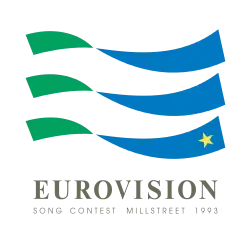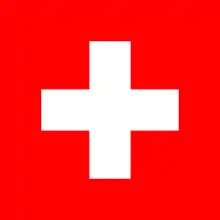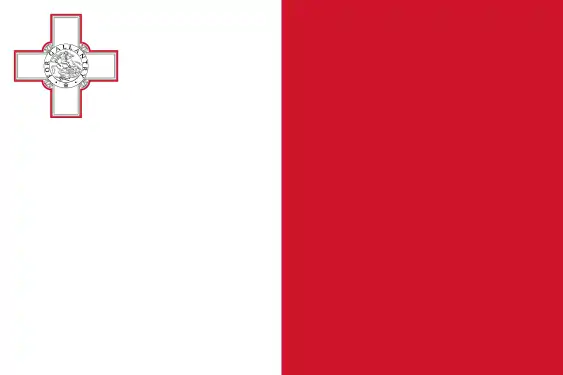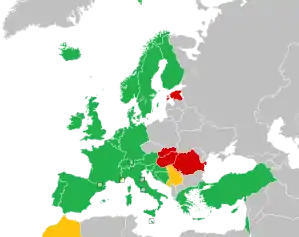Eurovision Song Contest 1993
The Eurovision Song Contest 1993 was the 38th edition of the Eurovision Song Contest. It took place in Millstreet, Ireland, following the country's victory at the 1992 contest with the song "Why Me?" by Linda Martin. Organised by the European Broadcasting Union (EBU) and host broadcaster Raidió Teilifís Éireann (RTÉ), the contest was held at the Green Glens Arena on Saturday 15 May 1993 and was hosted by Irish TV-reporter Fionnuala Sweeney, marking the first time since the 1987 contest that just one presenter had hosted the contest.
| Eurovision Song Contest 1993 | |
|---|---|
 | |
| Dates | |
| Final | 15 May 1993 |
| Host | |
| Venue | Green Glens Arena, Millstreet, Ireland |
| Presenter(s) | Fionnuala Sweeney |
| Musical director | Noel Kelehan |
| Directed by | Anita Notaro |
| Executive supervisor | Christian Clausen |
| Executive producer | Liam Miller |
| Host broadcaster | Raidió Teilifís Éireann (RTÉ) |
| Opening act | The story of Eochaid and Étaín in Celtic mythology, transitioning into a video of rural Ireland today. |
| Interval act | "Why Me?", performed by Linda Martin "Voices (Are Calling)", performed by Johnny Logan with the Children of Millstreet and the Cork School of Music Choirs. |
| Website | eurovision |
| Participants | |
| Number of entries | 25 |
| Debuting countries | |
| Returning countries | None |
| Non-returning countries | |
Participation map
| |
| Vote | |
| Voting system | Each country awarded 12, 10, 8–1 point(s) to their 10 favourite songs |
| Nul points in final | None |
| Winning song | "In Your Eyes" |
Twenty-five countries took part in the contest - the biggest number up until then. The breakup of Yugoslavia meant that many new countries wanted to participate in the competition. Therefore, Bosnia and Herzegovina, Croatia and Slovenia all competed for the first time in the contest this year.
Ireland scored a second victory in a row this year with the song "In Your Eyes" by Niamh Kavanagh. This was Ireland's fifth victory, and equalled the tally of five Eurovision victories achieved by France in 1977 and Luxembourg in 1983. Ireland became the fourth country to win two years in a row, after Spain in 1968 and 1969, Luxembourg in 1972 and 1973, and Israel in 1978 and 1979. Additionally, the top two countries of this contest were the same as the top two countries in the previous year's contest, being Ireland and the United Kingdom.
Location
The location for this year's edition of the contest was unique, in that Millstreet, with a population at the time of just 1,500 people, was the smallest host town ever chosen for the Eurovision Song Contest.
The owner of the Green Glens Arena, Noel C. Duggan, wrote to the RTÉ on the same night of the Irish victory in the 1992 edition, proposing the free use of the venue to host the contest. The venue, a large indoor and well- equipped equestrian centre that could accommodate a 3500 seated audience was deemed more than suitable as the location by host broadcaster RTÉ. With huge support from local and national authorities, plus several businesses in the region, the town's infrastructure was greatly enhanced in order to accommodate an event of this scale. Killarney, a larger town located 30 kilometres from Millstreet was chosen as a second host town, accommodating the majority of the contestants and delegates. It was also the largest outside broadcast ever attempted by state broadcaster RTÉ and was deemed a technical and logistical success for all involved.
The stage was created by Alan Farquharson, who was also chief production designer two years later in Dublin. The design resembled a scalene triangular shaped performance area, under lit by multicoloured cable lighting and featured a hydraulically controlled walkway, with a mirrored ceiling structure suspended above the stage that mirrored the floor shape and reflected lighting.
BBC newsreader Nicholas Witchell caused controversy by asking Mr Duggan, live on air and shortly before the contest, how he felt about holding a major international cultural event "in a cowshed in Ireland". Noel Duggan replied that, unlike the chaotic 1993 Grand National (which had taken place the previous month, but which was declared void following two false starts and the unsuccessful recall of the second), the 1993 Eurovision would start on time, it would finish on time and there would be a winner. Mr Duggan also noted that the Green Glens Arena was "a horseshed". Mr Witchell subsequently apologized for his question.[1]
Qualification
In the run-up to this contest, the European Broadcasting Union finally started to grapple with the explosion in the number of potential participating countries, caused by the dissolution of the Eastern bloc, and also by the disintegration of Yugoslavia, which had traditionally been the only communist country to take part in the contest. For the first time, a pre-qualifying round was introduced, but only for countries that had either never participated in the contest at all, or in the case of former republics of Yugoslavia, had not previously competed as nations in their own right. This was, however, merely a 'sticking-plaster' measure that was plainly not a sustainable solution for future years, as it would not be seen as remotely equitable. But in the meantime, Croatia, Bosnia and Herzegovina, Hungary, Slovenia, Slovakia, Romania and Estonia were left to battle it out in a special competition called Kvalifikacija za Millstreet in Ljubljana on 3 April for the mere three places available at the grand final in Millstreet. After some extremely tight voting, Bosnia and Herzegovina, Croatia and Slovenia edged through.
Participating countries
Conductors
Each performance had a conductor who directed the orchestra.[2][3]
 Italy – Vittorio Cosma
Italy – Vittorio Cosma Turkey – no conductor
Turkey – no conductor Germany – Norbert Daum
Germany – Norbert Daum Switzerland – Marc Sorrentino
Switzerland – Marc Sorrentino Denmark – George Keller
Denmark – George Keller Greece – Haris Andreadis
Greece – Haris Andreadis.svg.png.webp) Belgium – Bert Candries
Belgium – Bert Candries Malta – Joseph Sammut
Malta – Joseph Sammut Iceland – Jon Kjell Seljeseth
Iceland – Jon Kjell Seljeseth Austria – Christian Kolonovits
Austria – Christian Kolonovits Portugal – Armindo Neves
Portugal – Armindo Neves France – Christian Cravero
France – Christian Cravero Sweden – Curt-Eric Holmquist
Sweden – Curt-Eric Holmquist Ireland – Noel Kelehan
Ireland – Noel Kelehan Luxembourg – Francis Goya
Luxembourg – Francis Goya Slovenia – Jože Privšek
Slovenia – Jože Privšek Finland – Olli Ahvenlahti
Finland – Olli Ahvenlahti.svg.png.webp) Bosnia and Herzegovina – Noel Kelehan[lower-alpha 1]
Bosnia and Herzegovina – Noel Kelehan[lower-alpha 1] United Kingdom – Nigel Wright
United Kingdom – Nigel Wright Netherlands – Harry van Hoof
Netherlands – Harry van Hoof Croatia – Andrej Baša
Croatia – Andrej Baša Spain – Eduardo Leiva
Spain – Eduardo Leiva.svg.png.webp) Cyprus – George Theofanous
Cyprus – George Theofanous Israel – Amir Frohlich
Israel – Amir Frohlich Norway – Rolf Løvland
Norway – Rolf Løvland
Returning artists
| Artist | Country | Previous year(s) |
|---|---|---|
| Tony Wegas | 1992 | |
| Katri Helena | 1979 | |
| Tommy Seebach | 1979, 1981 (with Debbie Cameron) |
Results
| Draw | Country | Artist | Song | Language[4][5] | Place[6] | Points |
|---|---|---|---|---|---|---|
| 01 | Enrico Ruggeri | "Sole d'Europa" | Italian | 12 | 45 | |
| 02 | Burak Aydos | "Esmer Yarim" | Turkish | 21 | 10 | |
| 03 | Münchener Freiheit | "Viel zu weit" | German | 18 | 18 | |
| 04 | Annie Cotton | "Moi, tout simplement" | French | 3 | 148 | |
| 05 | Tommy Seebach Band | "Under stjernerne på himlen" | Danish | 22 | 9 | |
| 06 | Katy Garbi | "Ellada, hora tou fotos" (Ελλάδα, χώρα του φωτός) | Greek | 9 | 64 | |
| 07 | Barbara | "Iemand als jij" | Dutch | 25 | 3 | |
| 08 | William Mangion | "This Time" | English | 8 | 69 | |
| 09 | Inga | "Þá veistu svarið" | Icelandic | 13 | 42 | |
| 10 | Tony Wegas | "Maria Magdalena" | German | 14 | 32 | |
| 11 | Anabela | "A cidade (até ser dia)" | Portuguese | 10 | 60 | |
| 12 | Patrick Fiori | "Mama Corsica" | French, Corsican | 4 | 121 | |
| 13 | Arvingarna | "Eloise" | Swedish | 7 | 89 | |
| 14 | Niamh Kavanagh | "In Your Eyes" | English | 1 | 187 | |
| 15 | Modern Times | "Donne-moi une chance" | French, Luxembourgish | 20 | 11 | |
| 16 | 1X Band | "Tih deževen dan" | Slovene | 22 | 9 | |
| 17 | Katri Helena | "Tule luo" | Finnish | 17 | 20 | |
| 18 | Fazla | "Sva bol svijeta" | Bosnian | 16 | 27 | |
| 19 | Sonia | "Better the Devil You Know" | English | 2 | 164 | |
| 20 | Ruth Jacott | "Vrede" | Dutch | 6 | 92 | |
| 21 | Put | "Don't Ever Cry" | Croatian, English | 15 | 31 | |
| 22 | Eva Santamaría | "Hombres" | Spanish | 11 | 58 | |
| 23 | Zymboulakis and Van Beke | "Mi stamatas" (Μη σταματάς) | Greek | 19 | 17 | |
| 24 | Lehakat Shiru | "Shiru" (שירו) | Hebrew, English | 24 | 4 | |
| 25 | Silje Vige | "Alle mine tankar" | Norwegian | 5 | 120 |
Scoreboard
Each country had a jury who awarded 12, 10, 8, 7, 6, 5, 4, 3, 2, 1 point(s) for their top ten songs.
The 1993 contest was the last time juries would deliver their votes via telephone lines, with satellite video links introduced the following year.
| Italy | 45 | 1 | 7 | 10 | 5 | 10 | 8 | 2 | 2 | |||||||||||||||||
|---|---|---|---|---|---|---|---|---|---|---|---|---|---|---|---|---|---|---|---|---|---|---|---|---|---|---|
| Turkey | 10 | 1 | 2 | 1 | 6 | |||||||||||||||||||||
| Germany | 18 | 8 | 2 | 3 | 4 | 1 | ||||||||||||||||||||
| Switzerland | 148 | 10 | 12 | 10 | 7 | 8 | 5 | 4 | 6 | 1 | 12 | 6 | 7 | 12 | 8 | 4 | 10 | 8 | 2 | 3 | 6 | 4 | 3 | |||
| Denmark | 9 | 1 | 3 | 5 | ||||||||||||||||||||||
| Greece | 64 | 2 | 2 | 2 | 6 | 7 | 6 | 5 | 8 | 12 | 7 | 7 | ||||||||||||||
| Belgium | 3 | 3 | ||||||||||||||||||||||||
| Malta | 69 | 7 | 5 | 4 | 7 | 5 | 5 | 4 | 2 | 2 | 4 | 2 | 4 | 6 | 4 | 4 | 1 | 3 | ||||||||
| Iceland | 42 | 4 | 4 | 1 | 7 | 1 | 5 | 2 | 7 | 5 | 2 | 2 | 2 | |||||||||||||
| Austria | 32 | 4 | 1 | 3 | 3 | 6 | 12 | 3 | ||||||||||||||||||
| Portugal | 60 | 1 | 1 | 2 | 2 | 5 | 8 | 2 | 4 | 2 | 1 | 12 | 12 | 3 | 5 | |||||||||||
| France | 121 | 7 | 4 | 12 | 3 | 8 | 7 | 12 | 8 | 10 | 6 | 4 | 1 | 4 | 3 | 8 | 10 | 8 | 6 | |||||||
| Sweden | 89 | 8 | 8 | 7 | 10 | 7 | 10 | 4 | 5 | 6 | 7 | 7 | 10 | |||||||||||||
| Ireland | 187 | 12 | 1 | 5 | 12 | 6 | 6 | 2 | 12 | 3 | 8 | 6 | 10 | 12 | 7 | 12 | 3 | 8 | 12 | 10 | 6 | 10 | 7 | 5 | 12 | |
| Luxembourg | 11 | 10 | 1 | |||||||||||||||||||||||
| Slovenia | 9 | 4 | 1 | 3 | 1 | |||||||||||||||||||||
| Finland | 20 | 3 | 8 | 2 | 5 | 2 | ||||||||||||||||||||
| Bosnia and Herzegovina | 27 | 3 | 12 | 1 | 4 | 4 | 3 | |||||||||||||||||||
| United Kingdom | 164 | 1 | 8 | 6 | 5 | 8 | 12 | 12 | 12 | 7 | 6 | 10 | 8 | 8 | 10 | 5 | 3 | 4 | 10 | 5 | 4 | 12 | 8 | |||
| Netherlands | 92 | 6 | 6 | 7 | 7 | 3 | 6 | 3 | 5 | 12 | 7 | 10 | 3 | 7 | 10 | |||||||||||
| Croatia | 31 | 3 | 4 | 5 | 8 | 1 | 6 | 4 | ||||||||||||||||||
| Spain | 58 | 5 | 6 | 5 | 8 | 2 | 2 | 10 | 6 | 7 | 5 | 1 | 1 | |||||||||||||
| Cyprus | 17 | 2 | 10 | 5 | ||||||||||||||||||||||
| Israel | 4 | 3 | 1 | |||||||||||||||||||||||
| Norway | 120 | 10 | 10 | 10 | 12 | 6 | 10 | 8 | 5 | 1 | 3 | 12 | 7 | 6 | 12 | 8 | ||||||||||
12 points
Below is a summary of all 12 points in the final:
| N. | Contestant | Nation(s) giving 12 points |
|---|---|---|
| 7 | ||
| 4 | ||
| 3 | ||
| 2 | ||
| 1 | ||
Spokespersons
 Italy – Peppi Franzelin
Italy – Peppi Franzelin Turkey – Ömer Önder
Turkey – Ömer Önder Germany – Carmen Nebel
Germany – Carmen Nebel Switzerland – Michel Stocker[9]
Switzerland – Michel Stocker[9] Denmark – Bent Henius
Denmark – Bent Henius Greece – Fotini Giannoulatou[10]
Greece – Fotini Giannoulatou[10].svg.png.webp) Belgium – An Ploegaerts
Belgium – An Ploegaerts Iceland – Guðrún Skúladóttir
Iceland – Guðrún Skúladóttir Austria – Andy Lee
Austria – Andy Lee Portugal – Margarida Mercês de Melo[11]
Portugal – Margarida Mercês de Melo[11] France – Olivier Minne[12] (Co-presenter of the 2021 junior contest)
France – Olivier Minne[12] (Co-presenter of the 2021 junior contest) Sweden – Gösta Hanson[13]
Sweden – Gösta Hanson[13] Ireland – Eileen Dunne
Ireland – Eileen Dunne Luxembourg – TBC
Luxembourg – TBC Slovenia – Miša Molk
Slovenia – Miša Molk Finland – Solveig Herlin[14]
Finland – Solveig Herlin[14].svg.png.webp) Bosnia and Herzegovina – Dejan Zagorac
Bosnia and Herzegovina – Dejan Zagorac United Kingdom – Colin Berry[3]
United Kingdom – Colin Berry[3] Netherlands – Joop van Os
Netherlands – Joop van Os Croatia – Velimir Đuretić[15]
Croatia – Velimir Đuretić[15] Spain – María Ángeles Balañac[16]
Spain – María Ángeles Balañac[16].svg.png.webp) Cyprus – Anna Partelidou[17]
Cyprus – Anna Partelidou[17] Israel – Danny Rup[18]
Israel – Danny Rup[18] Norway – Sverre Christophersen[19]
Norway – Sverre Christophersen[19] Malta – Kevin Drake[20][lower-alpha 2]
Malta – Kevin Drake[20][lower-alpha 2]
Broadcasts
National broadcasters were able to send a commentary team to the contest, in order to provide coverage of the contest in their own native language.
| Country | Broadcaster(s) | Commentator(s) | Ref(s) |
|---|---|---|---|
| ORF 1 | Ernst Grissemann | [21] | |
| Hitradio Ö3 | Martin Blumenau | ||
| BRTN TV1 | Dutch: André Vermeulen | [22] | |
| RTBF1 | French: Claude Delacroix | [23] | |
| BRTN Radio 2 | Dutch: Julien Put | ||
| RTBF La Première | French: Stéphane Dupont and Patrick Duhamel | ||
| TV BiH | Ismeta Dervoz-Krvavac | ||
| HTV 1 | Aleksandar "Aco" Kostadinov | [24] | |
| RIK 1 | Evi Papamichail | [17] | |
| RIK Deftero | Pavlos Pavlou | ||
| DR TV | Jørgen de Mylius | [25] | |
| DR P3 | Ole Jacobsen | ||
| YLE TV1 | Erkki Pohjanheimo and Kirsi-Maria Niemi | [26][27] | |
| Radiomafia | Sanna Kojo and Outi Popp | ||
| France 2 | Patrice Laffont | [23] | |
| Erstes Deutsches Fernsehen | Jan Hofer | [28] | |
| Deutschlandfunk/WDR 4 | Horst Senker | ||
| ET1 | Dafni Bokota | [29] | |
| ERA 1 | Giorgos Mitropoulos | ||
| Sjónvarpið | Jakob Frímann Magnússon | [30] | |
| RTÉ 1 | Pat Kenny | ||
| RTÉ Radio 1 | Larry Gogan | ||
| Israeli Television | No commentator | ||
| Reshet Gimel | Yigal Ravid | ||
| Rai Uno | Ettore Andenna | [31] | |
| Rai Radio 2 | Antonio De Robertis | ||
| RTL Hei Elei | Maurice Molitor | ||
| TVM | Charles Saliba | ||
| Nederland 3 | Willem van Beusekom | [32] | |
| Radio 3 | Daniël Dekker | ||
| NRK | Leif Erik Forberg | [33] | |
| NRK P1 | Erik Diesen | ||
| RTP Canal 1 | Isabel Bahia | [11] | |
| SLO1 | Tajda Lekše | ||
| La Primera | José Luis Uribarri | [34] | |
| TV2 | Jan Jingryd and Kåge Gimtell | [13] | |
| SR P3 | Susan Seidemar and Claes-Johan Larsson | ||
| SF DRS | German: Mariano Tschuor | ||
| TSR | French: Jean-Marc Richard | ||
| TSI | Italian: Emanuela Gaggini | ||
| TRT 1 | Bülend Özveren | ||
| TRT Radyo 3 | Canan Kumbasar | ||
| BBC1 | Terry Wogan | [3] | |
| BBC Radio 2 | Ken Bruce | [3] |
| Country | Broadcaster(s) | Commentator(s) | Ref(s) |
|---|---|---|---|
| SBS TV | Unknown | ||
| ETV | Unknown | ||
| MTV 2 | István Vágó | ||
| MTV 2 | Antonio Dimitrievski and Ivan Mirčevski | ||
| TVP1 | Artur Orzech and Maria Szabłowska | ||
| TVR2 | Doina Caramzulescu | ||
| RTR | Vadim Dolgachyov | ||
| STV1 | Alena Heribanová | ||
| RTS 3K | Mladen Popović and Ekstra Nena | [35] |
Notes and references
Footnotes
- The nominated conductor for Bosnia and Herzegovina, Sinan Alimanović, was unable to safely commute to the flight to Ireland due to the ongoing Bosnian War; the contest's musical director, Noel Kelehan, subsequently led the orchestra during the Bosnian entry.
- Malta was originally scheduled to announce their votes as the 8th country, but instead voted 25th, after all the other countries announced their votes. The reason for this was technical difficulties in the minutes running up to the voting presentation.
References
- The Times (25 August 2005). "Witchell caught in off-air spat on VJ Day interview". London. Retrieved 1 December 2010.
- "And the conductor is..." Retrieved 10 September 2020.
- Roxburgh, Gordon (2020). Songs For Europe - The United Kingdom at the Eurovision Song Contest. Volume Four: The 1990s. UK: Telos Publishing. pp. 131–146. ISBN 978-1-84583-163-9.
- "Eurovision Song Contest 1993". The Diggiloo Thrush. Retrieved 5 March 2012.
- "Eurovision Song Contest 1993". 4Lyrics.eu. Retrieved 16 September 2020.
- "Final of Millstreet 1993". European Broadcasting Union. Archived from the original on 17 April 2021. Retrieved 17 April 2021.
- "Results of the Final of Millstreet 1993". European Broadcasting Union. Archived from the original on 17 April 2021. Retrieved 17 April 2021.
- "Eurovision Song Contest 1993 – Scoreboard". European Broadcasting Union. Archived from the original on 24 September 2015. Retrieved 24 October 2021.
- Baumann, Peter Ramón (OGAE Switzerland)
- "Εκφωνητές της ΕΡΤ για τις ψήφους της Ελλάδας στην EUROVISION – Page 3". Retromaniax.gr. Archived from the original on 11 September 2012. Retrieved 10 August 2012.
- "Comentadores Do ESC – escportugalforum.pt.vu | o forum eurovisivo português". 21595.activeboard.com. Archived from the original on 21 April 2012. Retrieved 10 August 2012.
- Laffont, Patrice et al. (15 May 1993). 38ème Concours Eurovision de la Chanson 1993 [38th Eurovision Song Contest 1993] (Television production). Ireland: RTÉ, France 2 (commentary).
- "Infosajten.com". Infosajten.com. Archived from the original on 18 July 2012. Retrieved 10 August 2012.
- "Selostajat ja taustalaulajat läpi vuosien? • Viisukuppila". Viisukuppila.fi. Retrieved 10 August 2012.
- "Pogledaj temu – SPOKESPERSONS". Forum.hrt.hr. 29 February 2008. Archived from the original on 14 March 2012. Retrieved 10 August 2012.
- "María Ángeles Balañac". Imdb.es. 1 May 2009. Archived from the original on 12 March 2012. Retrieved 10 August 2012.
- Savvidis, Christos (OGAE Cyprus)
- "פורום אירוויזיון". Sf.tapuz.co.il. 13 September 1999. Archived from the original on 8 October 2011. Retrieved 10 August 2012.
- Dyrseth, Seppo (OGAE Norway)
- "Malta eighth in Eurovision contest", The Sunday Times, 16 May 1993
- Archived 24 October 2007 at the Wayback Machine
- "Hasselt 2005: Jarige André Vermeulen verzorgt commentaar met Ilse Van Hoecke –". Eurosong.be. 25 October 2005. Retrieved 10 August 2012.
- Christian Masson. "1993 – Millstreet". Songcontest.free.fr. Retrieved 10 August 2012.
- "Pogledaj temu – POVIJEST EUROSONGA: 1956 – 1999 (samo tekstovi)". Forum.hrt.hr. 15 May 2009. Archived from the original on 14 March 2012. Retrieved 10 August 2012.
- "Forside". esconnet.dk. Archived from the original on 24 March 2012. Retrieved 10 August 2012.
- "Selostajat ja taustalaulajat läpi vuosien? • Viisukuppila". Viisukuppila.fi. Retrieved 10 August 2012.
- Julkaistu To, 29 April 2010 – 10:19 (29 April 2010). "YLE Radio Suomen kommentaattorit | Euroviisut | yle.fi | Arkistoitu". yle.fi. Retrieved 10 August 2012.
- "Eurovision Song Contest 1993". Ecgermany.de. Retrieved 10 August 2012.
- "Η Δάφνη Μπόκοτα και η EUROVISION (1987–2004)". Retromaniax.gr. Archived from the original on 12 September 2012. Retrieved 10 August 2012.
- "Dagblaðið Vísir – DV, 13.05.1993". Timarit.is. Retrieved 10 August 2012.
- Archived at Ghostarchive and the Wayback Machine: "Enrico Ruggeri Sole d'Europa Eurofestival 1993". YouTube. Retrieved 10 August 2012.
- "Welkom op de site van Eurovision Artists". Eurovisionartists.nl. Retrieved 10 August 2012.
- "Hvem kommenterte før Jostein Pedersen? – Debattforum". Nrk.no. Archived from the original on 2 November 2012. Retrieved 10 August 2012.
- "FORO FESTIVAL DE EUROVISIÓN • Ver Tema – Uribarri comentarista Eurovision 2010". Eurosongcontest.phpbb3.es. Archived from the original on 17 March 2012. Retrieved 10 August 2012.
- No live broadcast; RTS provided a special TV programme about the 1993 contest.
External links
| Wikimedia Commons has media related to Eurovision Song Contest 1993. |

